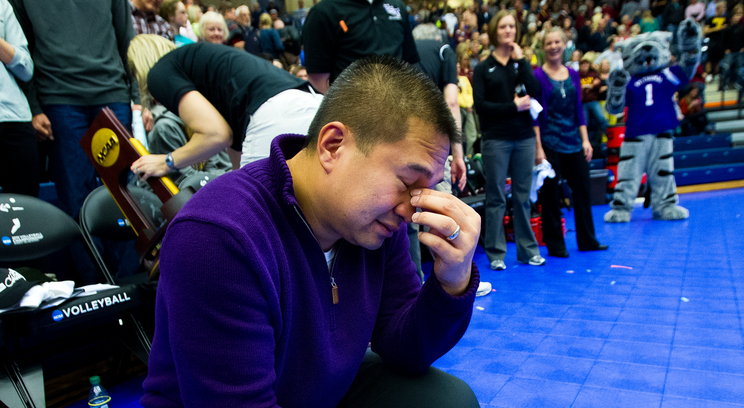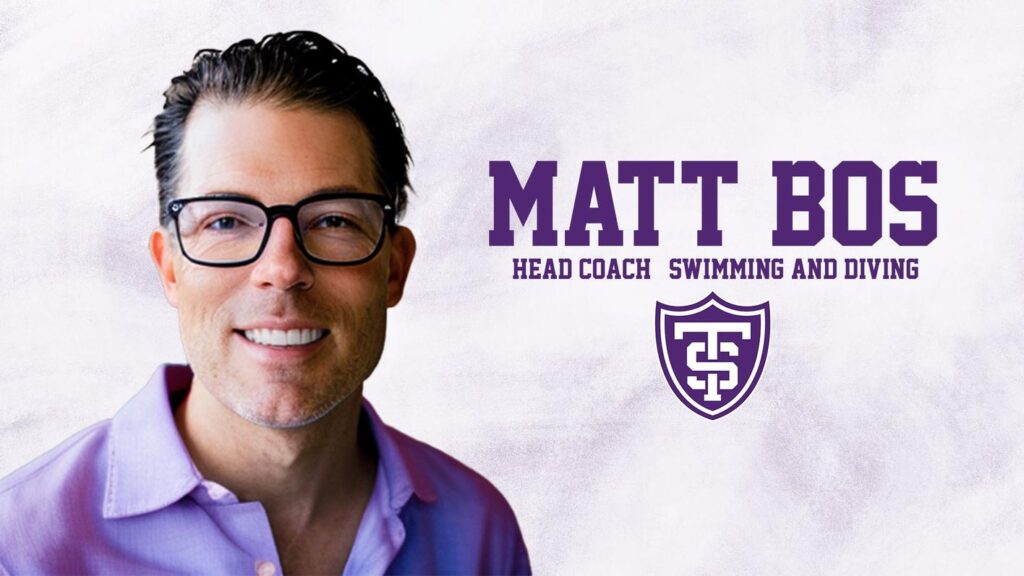I will never forget the looks on the faces of three St. Thomas coaches when their teams won national championships.
Baseball players hoisted Dennis Denning above their heads in 2009, and he was delighted but then horrified that they would drop him. Steve Fritz bear-hugged basketball players in 2011 and hours later still wore the remnants of a net they cut down. Thanh Pham crouched on the sidelines last November with a hand to his eyes to wipe away tears as his volleyball players celebrated.

Steve Fritz, championship net around his neck, hugs Teddy Archer March 19, 2011 after the men's basketball team took first place in the nation. (Photo by Mike Ekern '02)
The images remain indelible, and they should. The moments defined excellence. They rewarded hard and selfless work. They generated recognition. They opened doors.
And perhaps most importantly, they engendered pride. They gave people, even casual observers, a chance to simply say, “We’re No. 1.”
Everybody likes to be No. 1. Few get the opportunity, and sometimes things don’t work out. As much success as St. Thomas has had in winning 15 national championships in eight different NCAA Division III sports, second only to Williams College’s nine champion sports, the Tommies also have experienced their share of painful defeats. Football was the most recent national runner-up, one of 12 second place finishes (also by teams in baseball, softball, men’s hockey, women’s cross country and women’s outdoor track).
Pham and Fritz believe national championships are important for a team, a program and an institution.
A team? “It’s validation,” said Pham, whose Tommies lost first-round matches in the 2010 and 2011 national tournaments but won the 2012 crown in five sets after trailing No. 1 Calvin 0-2. “Work hard and good things will happen. You can be down, but don’t lose faith. There’s always a solution; you just have to find it. That this team won speaks volumes to its character, its resilience and its desire.”
A program? “It gives you a certain amount of status,” said Fritz, athletic director since 1992, who retired after 31 years as men’s basketball coach when the Tommies won the 2011 title. “When you recruit, people know you have a good program. It opens doors.”

Tommie baseball players hoist their trophy and their head coach, Dennis Denning, onto their shoulders following a victory over Wooster College May 26, 2009 to take the national title. (Photo by Mike Ekern '02)
An institution? “It draws attention to St. Thomas in a positive manner – in how prospective students will look at us, in how students here will share in our joy, and in how our alumni can be very proud of their school,” Pham said.
Fritz agrees and likes to call sports “a front porch.” The success of any given team “becomes part of the success of the entire institution,” he said. “It’s very visible” and – at a time when higher education faces growing criticism for costs and relevance – “it’s good news.”
Glenn Caruso knows all of that as he, too, pursues a national title. Two days before his football team played Mount Union, he spoke with his players as they sat on a Virginia field after practice.
“Look around,” he said. “This is where we will play for the national championship. There are 238 teams (in Division III), and only two are left. You are one of them.”
The Tommies didn’t quite get to the top in that game. But I have no doubt they will in the future, and I can hardly wait to see the look on Caruso’s face. It will be indelible.
Read more from St. Thomas Magazine.






